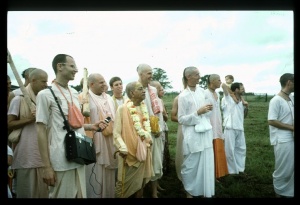CC Adi 7.70

A.C. Bhaktivedanta Swami Prabhupada
TEXT 70
prabhāve dekhiye tomā sākṣāt nārāyaṇa
hīnācāra kara kene, ithe ki kāraṇa
SYNONYMS
prabhāve—in Your opulence; dekhiye—I see; tomā—You; sākṣāt—directly; nārāyaṇa—the Supreme Personality of Godhead; hīna-ācāra—lower-class behavior; kara—You do; kene—why; ithe—in this; ki—what is; kāraṇa—reason.
TRANSLATION
“You look as brilliant as if You were Nārāyaṇa Himself. Will You kindly explain the reason that You have adopted the behavior of lower-class people?”
PURPORT
Due to renunciation, Vedānta study, meditation and the strict regulative principles of their daily routine, Māyāvādī sannyāsīs are certainly in a position to execute pious activities. Thus Prakāśānanda Sarasvatī, on account of his piety, could understand that Caitanya Mahāprabhu was not an ordinary person but the Supreme Personality of Godhead. Sākṣāt nārāyaṇa: he considered Him to be Nārāyaṇa Himself. Māyāvādī sannyāsīs address one another as Nārāyaṇa because they think that they are all going to be Nārāyaṇa or merge with Nārāyaṇa in the next life. Prakāśānanda Sarasvatī appreciated that Caitanya Mahāprabhu had already directly become Nārāyaṇa and did not need to wait until His next life. One difference between the Vaiṣṇava and Māyāvādī philosophies is that Māyāvādī philosophers think that after giving up their bodies they are going to become Nārāyaṇa by merging with His body, whereas Vaiṣṇava philosophers understand that after the body dies they are going to have a transcendental, spiritual body in which to associate with Nārāyaṇa.